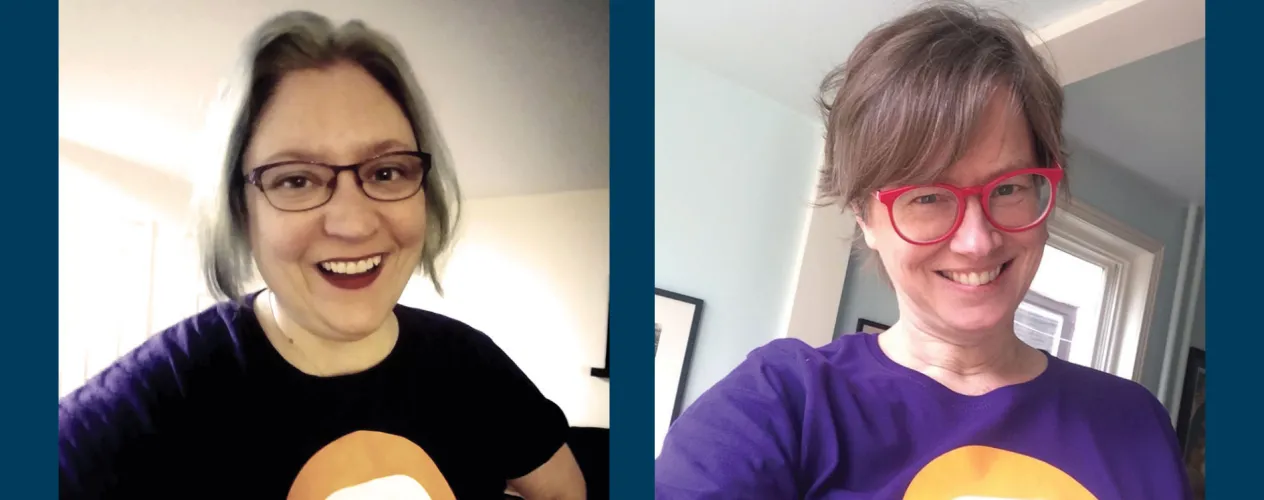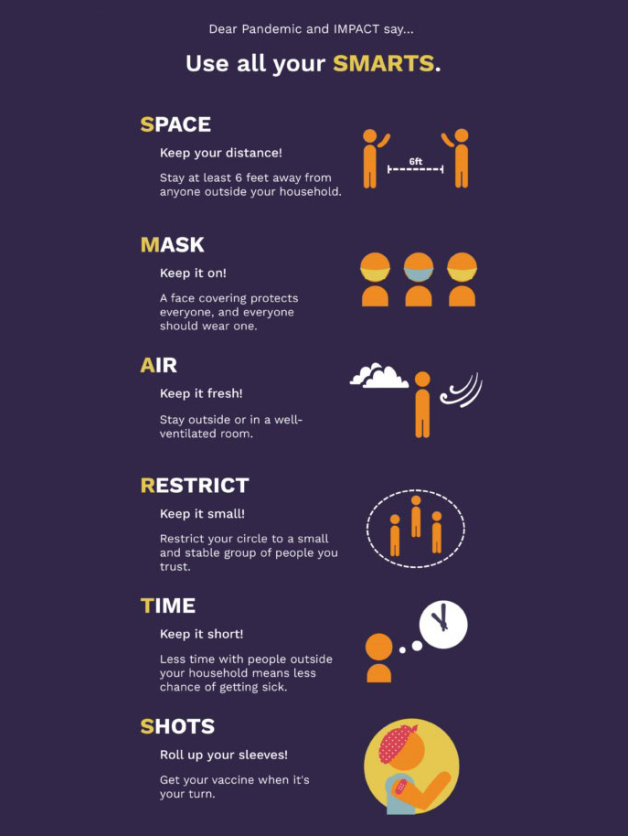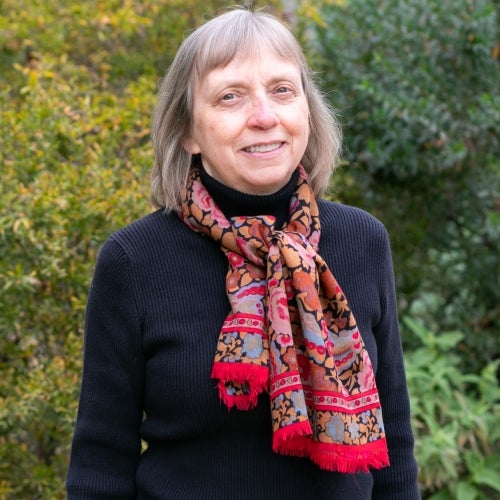It's a Pandemic. They've Got Answers.
After finding their expertise in demand, two FSPH alumni launched the popular Dear Pandemic website and social media resource, where a team of scientists who call themselves “Those Nerdy Girls” dispense practical, evidence-based responses to inquiries on all aspects of life during COVID-19.

When Dr. Malia Jones (MPH '08, PhD '12) sent an email to friends and family on March 5, 2020, with her insights about a looming pandemic, she couldn’t have known what would follow.
A social epidemiologist at the University of Wisconsin-Madison who studies how infectious diseases spread through populations, Jones had intended to advise the people in her circle what was likely to unfold over the next few weeks, as well as offer practical tips on how they could protect themselves now that community spread of the novel coronavirus was occurring around the world. But her email went viral. It was posted on Facebook and shared some 100,000 times, with Jones’ email address attached. USA Today published an adapted version as an op-ed. Suddenly Jones’ inbox was being flooded. “I was receiving hundreds of questions per hour from people looking for answers on what the risk really was and how to understand all these new words that were flying around,” Jones says. Just when she thought things couldn’t get more surreal, Jones was invited to appear on the popular “Dr. Phil” television show.
Wondering how best to handle the barrage of inquiries, Jones contacted Dr. Alison Buttenheim (PhD ’07), an associate professor at the University of Pennsylvania School of Nursing. A behavioral scientist who focuses on infectious disease prevention, Buttenheim shares Jones’ interest in overcoming vaccine hesitancy. Since graduating from the UCLA Fielding School — both with the same doctoral adviser, Dr. Anne Pebley, the Fred H. Bixby Chair and professor in FSPH’s Department of Community Health Sciences — Buttenheim and Jones had become friends and frequent research collaborators. Buttenheim, whose social media posts were also attracting considerable attention, suggested they coordinate their efforts and post all of the answers to the questions coming their way in one publicly accessible space.
Jones and Buttenheim launched Dear Pandemic on Instagram on March 10, 2020, the day before the World Health Organization declared the SARS-CoV-2 outbreak to be a pandemic. Three days later Dear Pandemic was on Facebook, and its mission — “to educate and empower individuals to successfully navigate the COVID-19 information overwhelm” — found an audience that has continued to grow. After a mutual acquaintance declared in response to an early Facebook post, “For the rest of the pandemic, I’m just going to listen to those nerdy girls,” Jones and Buttenheim had found their handle.
More than a year later, Dear Pandemic has logged hundreds of searchable posts spanning the gamut of pandemic-related concerns. Jones and Buttenheim have recruited a team of more than 30 public health professionals and academics — all women, the majority of them doctorally trained — with wide-ranging expertise who volunteer their time to craft layfriendly, evidence-based responses to reader inquiries, as well as posts interpreting the latest developments for public consumption. The messages, delivered with humor and compassion, are reaching an audience the two academic co-founders continue to marvel over. Two Facebook accounts, one in Spanish, recently crossed 100,000 followers between them. Many more are exposed via Instagram, Twitter, LinkedIn, or through a subscription to the Dear Pandemic e-newsletter. The website (dearpandemic.org) attracts approximately 40,000 visitors per month. And that’s to say nothing of the people who hear from “Those Nerdy Girls” via shares, retweets and forwards, or the devotees who wear T-shirts and masks with the Dear Pandemic logo.
I was receiving hundreds of questions per hour from people looking for answers on what the risk really was and how to understand all these new words that were flying around.

In March 2021, Dear Pandemic included this infographic with a response to a question about families with vaccinated adults and unvaccinated children socializing.
A key to Dear Pandemic’s success is the connection Jones, Buttenheim, and their colleagues have with their readers — many of whom, Buttenheim says, are women bearing much of the family decision-making load. “For those who follow us we have established this ‘nerd node of trust’ that makes us a go-to when they’re looking for information,” Buttenheim explains. “People find us relatable and trustworthy,” Jones adds. “They know we’re going to give the best information available, without any spin. We try to keep it fun and light-hearted, and when the topic isn’t fun and lighthearted, we’re real about all the feels that go along with it.”
Beyond the trust and relatability is the practical nature of the advice coming from the Dear Pandemic team. “It’s become clear to me through this experience that most people have difficulty taking general guidance and applying it to their situation, and we can get much more specific and practical than the CDC or public health departments can,” Jones says. “It’s one thing to say, ‘Wear a mask,’ but people enacting that guidance want to know things like which mask, where can they get one for their 6-year-old, do they need to wear it outdoors, and does it matter how many people are around?”
Not surprisingly, the focus of the questions Dear Pandemic followers have submitted has shifted with the evolving pandemic. “At the beginning people mostly wanted us to translate the science and epidemiology to tell them what was going on,” Buttenheim says. “Then there were questions on practical lifestyle guidance — this very specific thing is happening in my life, is it safe? The other pieces that have emerged are the mental wellness and coping with the pandemic, and the infodemiology — how can I be a good information consumer, less susceptible to misinformation and disinformation? And how can I fight the misinformation I see in my own social network?” More recently, she notes, inquiries have revealed the persistence of myths that fuel vaccine hesitancy.
The experience of the last year-plus has informed the academic work of the Dear Pandemic team. “We’re all now very keen to produce scholarship about this as a public health intervention, which we’ve seen it as all along,” Buttenheim says. She and her colleagues are looking into using machine-learning and language-processing techniques on Dear Pandemic posts and comments to learn how themes changed over time. “I see lots of both scientific research potential and real-world impact potential from Dear Pandemic,” Jones says. “I’m excited about future projects that will emerge directly from this.”
As public health experts, Jones and Buttenheim never dreamed they would be reaching such a large audience, but both say they have long been interested in communicating public health science to the broader population, and hope to build on what they’ve started. “In a very real way, being part of Dear Pandemic is also an intervention for us as individuals and professionals,” Buttenheim says. “We have drawn on each other for emotional support and scientific input, and have gained both insights and wonderful connections.”
“All along, we’ve been building this ship while we’ve been sailing it,” Jones says. “It’s been a ton of work, but imagining the last year without this team doesn’t bear thinking about. I don’t exactly know what the destination is, but we plan to continue this in some form.”
